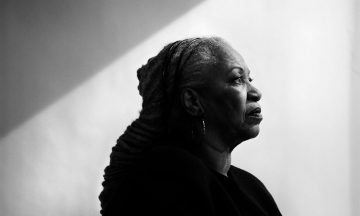Michiko Kakutani in The Guardian:
 In novels spanning several hundred years of history, Toni Morrison used her historical imagination and her remarkable gifts of language to chronicle the horrors of slavery and Jim Crow, and their continuing fallout on the everyday lives of black Americans. Violent, heart-wrenching events occur in her fiction: a runaway slave named Sethe cuts the throat of her baby daughter with a handsaw to spare her the fate she suffered herself as a slave (Beloved); a cosmetics salesman hunts down his lover and shoots her dead (Jazz); a woman pours kerosene on her drug-addicted son and sets him on fire (Sula). Such horrifying events are acts of desperation that can be comprehended only in the context of the earlier tragedies these characters or their families have suffered. In fact, if there is one insistent theme in Morrison’s novels, it’s the ways in which the past inexorably shapes the present, erasing innocence, cutting off options of escape, and warping relationships between women and men, parents and children.
In novels spanning several hundred years of history, Toni Morrison used her historical imagination and her remarkable gifts of language to chronicle the horrors of slavery and Jim Crow, and their continuing fallout on the everyday lives of black Americans. Violent, heart-wrenching events occur in her fiction: a runaway slave named Sethe cuts the throat of her baby daughter with a handsaw to spare her the fate she suffered herself as a slave (Beloved); a cosmetics salesman hunts down his lover and shoots her dead (Jazz); a woman pours kerosene on her drug-addicted son and sets him on fire (Sula). Such horrifying events are acts of desperation that can be comprehended only in the context of the earlier tragedies these characters or their families have suffered. In fact, if there is one insistent theme in Morrison’s novels, it’s the ways in which the past inexorably shapes the present, erasing innocence, cutting off options of escape, and warping relationships between women and men, parents and children.
As in William Faulkner’s work, the past is never dead for Morrison’s people – it’s not even past. Faulkner was clearly an influence on Morrison’s writing, as were Ralph Ellison, Virginia Woolf, Gabriel García Márquez and African American folklore. But Morrison forged from such disparate sources a voice that was all her own – fierce, poetic and Proustian in its ability to fuse time present and time past.
Her 1987 masterpiece Beloved created a harrowing portrait of slavery that possesses all the resonance of a classical myth, while remaining grounded in the awful particulars of American history.
More here.
